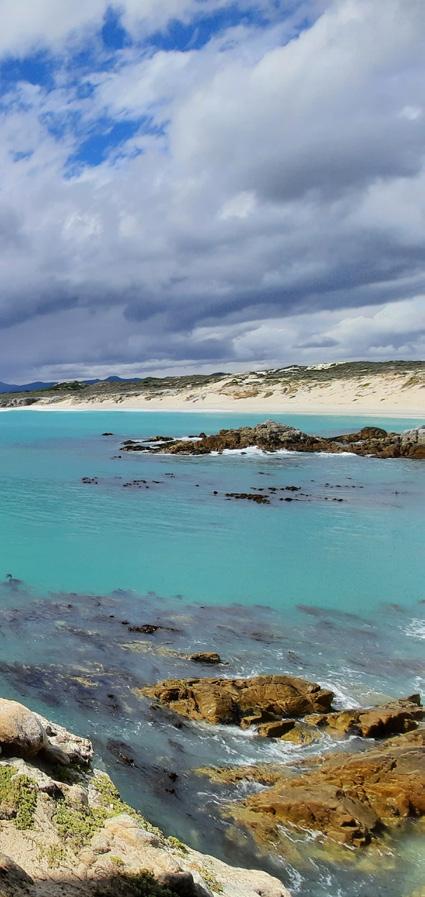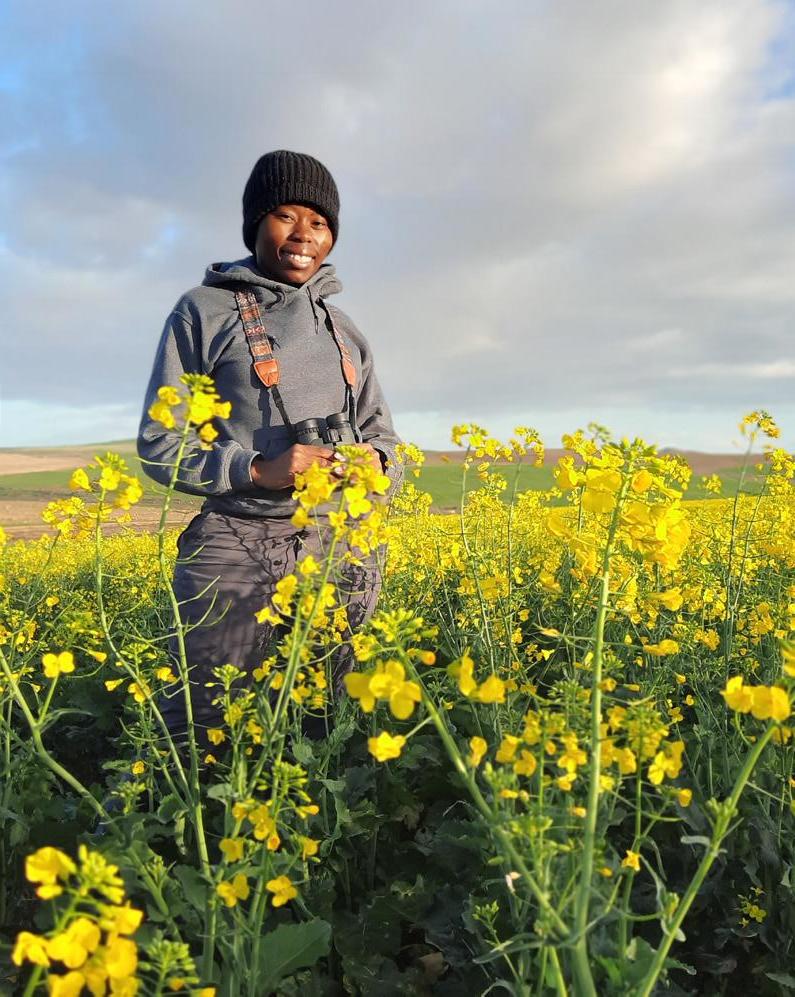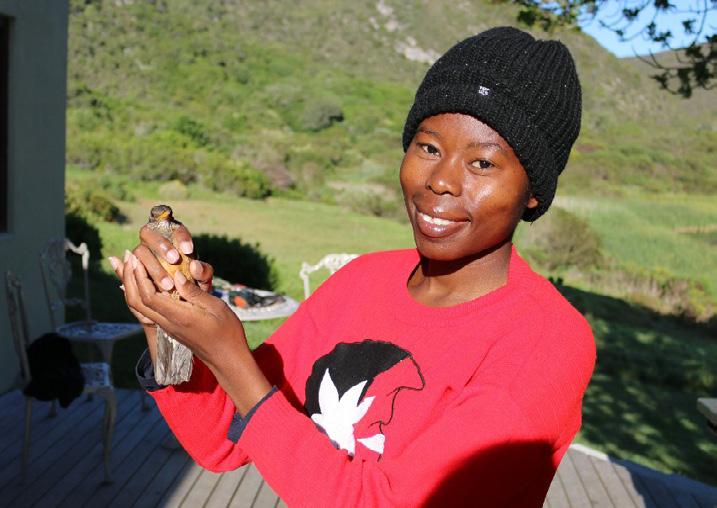
5 minute read
Diaries Of An African Ornithologist
Diaries Of An African Ornithologist By Merlyn Nomsa Nkomo
The first time you sharpen the focus on a pair of binoculars to look at a bird, a whole new world is revealed to you. It is like finding a secret door into a wing of a mansion you have lived in for years and realising just how much there is to discover.
The first bird I ever identified was an Emerald Spotted Dove in Hwange National Park in Zimbabwe. I stood in awe describing its vivid colours to the lecturer who was teaching me how to use his binoculars. In that moment I was shocked to note that doves weren’t white after all. This experience changed my life, forever setting me on a course of immense discovery, and this discovery was not only my talents and limits but also my insatiable love for travel, history, culture and sharing the wonder of nature. At present, I am a Conservation Biology master’s student at the University of Cape Town in South Africa, pursuing my long-time passion

for birds of prey. So many have asked me: Why birds?
Choosing a career in conservation was strange from the first time I verbalised it in a room full of my peers in high school on Career Day. The university student addressing us and telling us of the wide range of possibilities that awaited us in university had just told me that a degree in Forestry would be suitable for my interests. Everyone found this not only strange but funny and they all laughed. The question of why birds, therefore, never surprises or offends me because the norm is, we cannot aspire to become what we do not see those like ourselves being. After a few years of using this question as a conservation teachable moment, I decided to become the Ornithologist others like myself can see and aspire to be because representation is everything.
Birdwatching, previously perceived as an old white folk hobby, is now one of the most popular activities connecting people globally. As a new birder, it became an exciting challenge and seeing a new bird was the reward that crowned my day. Familiar childhood sounds came alive in 3D as I saw the birds that were singing and calling them. I found out that some of these birds were migrants, traversing over countries, regions, and continents, flying over oceans and places I would never reach in my lifetime. This opened my mind up to how big the world is. I watched birds to connect to the lifetime I had already lived ignorant of them and the people, landscapes and seasons they witness on their flights to the perch I see them on. In this small way, I travelled and learnt about different countries and cultures on the wings of the birds facing different threats in a rapidly changing world.
THE THRILL OF A BIRDER’S LIFE
Unbelievable to many, seeing a new species of birds is one of the best experiences I enjoy from time to time, and exploring new environments is easily one of the most fulfilling parts of my work. An iconic place that come to mind is the hills of Matobo World Heritage Site in Zimbabwe. Matobo is a granite boulder-strewn landscape that is a cathedral of history, tradition, art, nature and biodiversity. Matobo also has the densest population of the magnificent Verreaux’s Eagles in all their range. This eagle is one of over fifty species of birds of prey that have been recorded in the area, thirty-two of which are resident breeding species.
The density and diversity of the raptor community in
Matobo is a privilege to experience in my backyard as a raptor biologist from a city just forty kilometres away. Additionally, the rural communities in Matobo have intricate histories and traditional beliefs linked to the wildlife and they co-exist in reverence of birds such as the Southern Ground-hornbill, affording them protection like nowhere else in their entire range. Centuries of history on the beautiful co-existence of man and wildlife can be found on numerous caves in this landscape with the densest rock art in the world.
ORNITHOLOGY IN THE PROTECTION OF BIRD SPECIES
Birdwatching is a pro-environment activity and ornithology is a step forward in protecting birds and their environment, it is hard to imagine any negative impacts coming from these activities. However, Avitourism is a fast-growing niche tourism market. In 2010, South Africa estimated international Avi-tourists to spend between R309- R618 million annually. In other parts of the world, the birding culture had unintended negative impacts birders should learn from. The obsessive-competitive approach to birding causes much unnecessary travel, contributing to greenhouse emissions and disturbances to fragile habitats with rare sought-after species.
Whilst financial benefits to this market are great, very little trickles down to the local economy where these birds are found. Consequently, no relationships are built between the locals living side by side with these important birds while they are exposed to the affluence of birding. We have seen other impacts of birders in the kind of scientific information we produce being skewed towards where birders choose to travel to and local bird names and knowledge being largely excluded, unreported or worse presented in a bad light. Much work must be done to improve the ways we follow birds in an ethical, inclusive, and mindful way.
LIBERTY, AN AFRICAN BIRDER AND BUILDING BRIDGES.
To me birds represent liberty, the ability to rise from the ground and float above the landscape, seeing things impossible to perceive from a linear perspective below. My passion for ornithology compelled me to overcome my insecurities, organise public education events, write about birds and my work. Finding one’s voice may be a natural progression for all in life, however, if you are a misfit in your community and also in your career path this can be very difficult. As a young birder, I had a lot to learn about my chosen field after embracing my passion for it. The conflict between African thought and viewpoints about not only my career choice but the field of conservation became a challenge in my self-expression. I was a scientist in a privileged standpoint approaching conservation problems in Africa from a perception I knew was flawed and I knew this because, on the other hand, I was and still am, an African in Africa. In my work, I now aspire to represent African thought and build bridges between communities and the scientific community.
I never set out to change the world, I followed my curiosity and love for birds and it has been the most rewarding journey I’ve ever travelled on.















